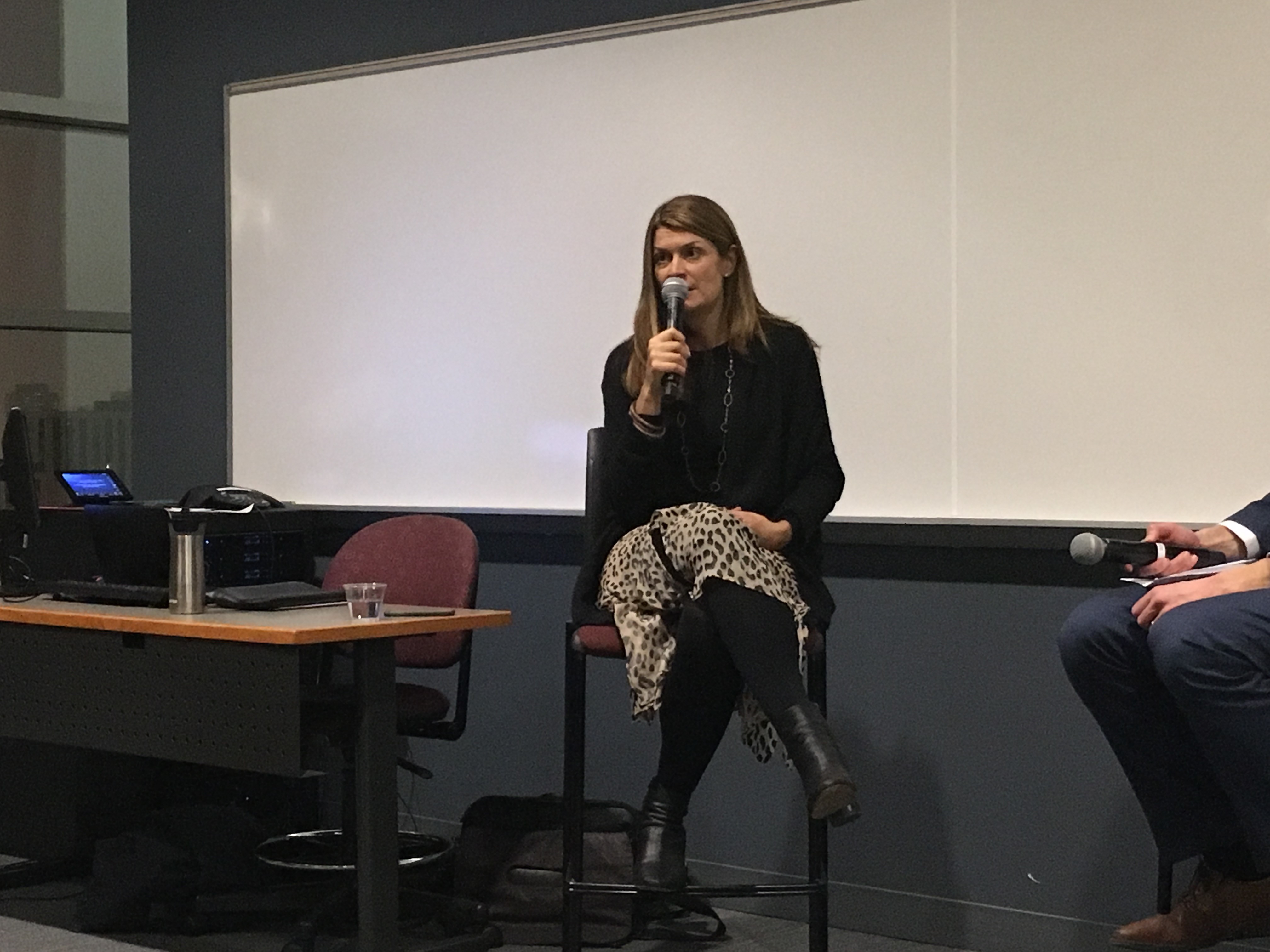Vetter shares cross-sectoral career journey

Johanna Vetter, CMO of the Ounce of Prevention Fund, speaks with students and leaders about her inspired career journey in business and the social sector.
By Hannah Puvalowski, Student Reporter
Leaders and students alike crowded into the Schreiber Center on January 28th to enjoy a dinner and discussion with Johanna Vetter, the chief marketing executive (CMO) of the Ounce of Prevention Fund. The conversation engaged audience members in dialogue around how to do good in both the for-profit and non-profit sectors.
Prior to working at the Ounce, Vetter pursued her dream job out of college at a marketing firm in Manhattan. After several leadership roles in the for-profit section, Vetter transitioned to a role with America’s Second Harvest, which later transformed into what is now Feeding America. Throughout these transitions, Vetter stated, “I followed my gut and my heart in terms of different opportunities.”
Shift from for-profit to non-profit
Vetter described the transition into the social sector as having both differences and similarities to her private sector career. One variance she noted was the level of resources; but she put a positive frame on this difference, saying the lack of resources in the non-profit sector presented her with the “opportunity to do things differently and to engage people who wanted to help” as volunteers.
Advice for future leaders
After discussing how she effectively made the switch, Vetter offered some advice for those looking for a similar career path. She encouraged students to gain training in the private sector before switching to the nonprofit sector, saying that business often has more resources to provide extensive professional development. The biggest piece of advice about pursing non-profit opportunities is that “you have to be seeking and plugged in.” In the social sector there is a limited recruiting investment and less visibility in open positions, which makes engaging the network you have increasingly important.
Marketing matters
A reoccurring theme in the discussion was the essential role of marketing for both private and social sector institutions. In the social sector, Vetter said that marketing addresses the challenge of how to engage donors and ultimately sustain your social impact.
Rebranding business
During the discussion that followed Vetter’s talk, Jessica Pedroza, a senior in the Quinlan School of Business, asked Vetter, “how can students within the business school break the stigma that business is not a force of good?” Vetter responded that “having leaders in prominent business organizations… do more and do better” is part of the solution. Through her cross-sectoral experiences, Vetter certainly is an extraordinary example of a business executive who is doing more and doing better to address the most urgent social issues of our time.
By Hannah Puvalowski, Student Reporter
Leaders and students alike crowded into the Schreiber Center on January 28th to enjoy a dinner and discussion with Johanna Vetter, the chief marketing executive (CMO) of the Ounce of Prevention Fund. The conversation engaged audience members in dialogue around how to do good in both the for-profit and non-profit sectors.
Prior to working at the Ounce, Vetter pursued her dream job out of college at a marketing firm in Manhattan. After several leadership roles in the for-profit section, Vetter transitioned to a role with America’s Second Harvest, which later transformed into what is now Feeding America. Throughout these transitions, Vetter stated, “I followed my gut and my heart in terms of different opportunities.”
Shift from for-profit to non-profit
Vetter described the transition into the social sector as having both differences and similarities to her private sector career. One variance she noted was the level of resources; but she put a positive frame on this difference, saying the lack of resources in the non-profit sector presented her with the “opportunity to do things differently and to engage people who wanted to help” as volunteers.
Advice for future leaders
After discussing how she effectively made the switch, Vetter offered some advice for those looking for a similar career path. She encouraged students to gain training in the private sector before switching to the nonprofit sector, saying that business often has more resources to provide extensive professional development. The biggest piece of advice about pursing non-profit opportunities is that “you have to be seeking and plugged in.” In the social sector there is a limited recruiting investment and less visibility in open positions, which makes engaging the network you have increasingly important.
Marketing matters
A reoccurring theme in the discussion was the essential role of marketing for both private and social sector institutions. In the social sector, Vetter said that marketing addresses the challenge of how to engage donors and ultimately sustain your social impact.
Rebranding business
During the discussion that followed Vetter’s talk, Jessica Pedroza, a senior in the Quinlan School of Business, asked Vetter, “how can students within the business school break the stigma that business is not a force of good?” Vetter responded that “having leaders in prominent business organizations… do more and do better” is part of the solution. Through her cross-sectoral experiences, Vetter certainly is an extraordinary example of a business executive who is doing more and doing better to address the most urgent social issues of our time.
